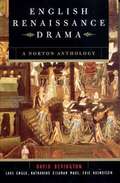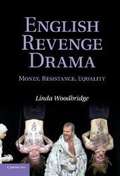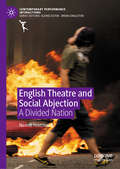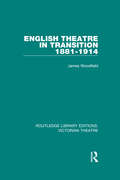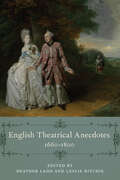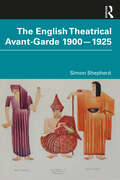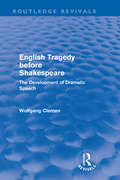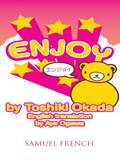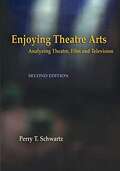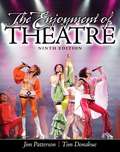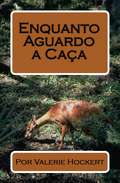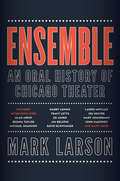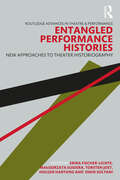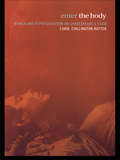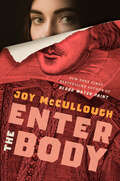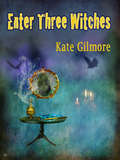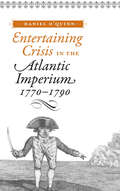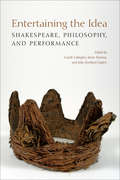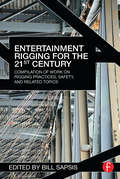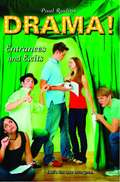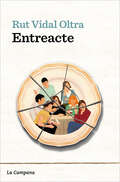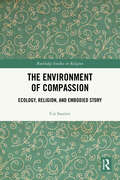- Table View
- List View
English Poetry And Drama Part-2
by Directorate of Distance Education Annamalai University CuddaloreThe course on “Poetry and Drama” aims at introducing the learner to some of the splendid specimens of poetry that are thought-provoking and inspiring. It also acquaints the learner with a classic comedy of Shakespeare and some of the short modern plays that deal with modern problems. Moreover, the student can learn the usage of modern English idiom.
English Poetry And Drama Part-II Units I-V
by Directorate of Distance Education Annamalai University Tamil NaduThe course on “Poetry and Drama” aims at introducing the learner to some of the splendid specimens of poetry that are thought-provoking and inspiring. It also acquaints the learner with a classic comedy of Shakespeare and some of the short modern plays that deal with modern problems. Moreover, the student can learn the usage of modern English idiom.
English Renaissance Drama: A Norton Anthology
by David Bevington Lars Engle Katharine Eisaman Maus Eric RasmussenPopular in their own time, the 27 plays included here—by Christopher Marlowe, Ben Jonson, John Webster, Thomas Middleton, among many others—reveal why these playwrights' achievements, like Shakespeare's, deserve reading, teaching, and performing afresh in our time. Edited by a team of exceptional scholars and teachers, this anthology opens an extraordinary tradition in drama to new readers and audiences.
English Revenge Drama: Money, Resistance, Equality
by Linda WoodbridgeVengeance permeates English Renaissance drama - for example, it crops up in all but two of Shakespeare's plays. This book explores why a supposedly forgiving Christian culture should have relished such bloodthirsty, vengeful plays. A clue lies in the plays' passion for fairness, a preoccupation suggesting widespread resentment of systemic unfairness - legal, economic, political, and social. Revengers' precise equivalents - the father of two beheaded sons obliges his enemy to eat her two sons' heads - are vigilante versions of Elizabethan law, where penalties suit the crimes: thieves' hands were cut off, scolds' tongues bridled. The revengers' language of 'paying' hints at the operation of revenge in the service of economic redress. Revenge makes contact with resistance theory, justifying overthrow of tyrants, and some revengers challenge the fundamental inequity of social class. Woodbridge demonstrates how, for all their sensationalism, their macabre comedy and outlandish gore, Renaissance revenge plays do some serious cultural work.
English Theatre and Social Abjection: A Divided Nation (Contemporary Performance InterActions)
by Nadine HoldsworthFocusing on contemporary English theatre, this book asks a series of questions: How has theatre contributed to understandings of the North-South divide? What have theatrical treatments of riots offered to wider debates about their causes and consequences? Has theatre been able to intervene in the social unease around Gypsy and Traveller communities? How has theatre challenged white privilege and the persistent denigration of black citizens? In approaching these questions, this book argues that the nation is blighted by a number of internal rifts that pit people against each other in ways that cast particular groups as threats to the nation, as unruly or demeaned citizens – as ‘social abjects’. It interrogates how those divisions are generated and circulated in public discourse and how theatre offers up counter-hegemonic and resistant practices that question and challenge negative stigmatization, but also how theatre can contribute to the recirculation of problematic cultural imaginaries.
English Theatre in Transition 1881-1914 (Routledge Library Editions: Victorian Theatre #6)
by James WoodfieldOriginally published in 1984. The turn of the nineteenth and twentieth centuries was a time of considerable change in the English theatre. Victorian attitudes were shocked or shattered by the new drama of Ibsen; the major figure of George Bernard Shaw dominated the period; theatre censorship was the subject of a long and furious contest; and staging conventions changed from the spectacular stylings of Irving and Beerbohm Tree to the masking and statuesque styles of Isadora Duncan and the inner realism of Stanislavsky. This book traces the activities of the leading figures in the English theatre, notably William Archer who introduced Ibsen to this country and who became one of the main promoters of the idea of a National Theatre. Other personalities discussed include Harley Granville Barker, particularly his association with Shaw at the Court Theatre and his part in campaigns against censorship and for changes in the staging of Shakespeare, and Edward Gordon Craig, whose rebellion against the Victorian theatre took and anti-realist direction. This is a stimulating account of the background to the modern English theatre which can only increase appreciation of its standard and variety.
English Theatrical Anecdotes, 1660-1800 (Performing Celebrity)
by Leslie Ritchie Máire MacNeill Heather Ladd Chelsea Phillips Nevena Martinovic Michael Burden Fiona Ritchie Seth Wilson Elaine McGirr Amanda Weldy Boyd Danielle BobkerThe essays in English Theatrical Anecdotes, 1660-1800 explore the theatrical anecdote’s role in the construction of stage fame in England’s emergent celebrity culture during the long eighteenth century, as well as the challenges of employing such anecdotes in theatre scholarship today. This collection showcases scholarship that complicates the theatrical anecdote and shows its many sides and applications beyond the expected comic punch. Discussing anecdotal narratives about theatre people as producing, maintaining, and sometimes toppling individual fame, this book crucially investigates a key mechanism of celebrity in the long eighteenth century that reaches into the nineteenth century and beyond. The anecdote erases boundaries between public and private and fictionalizing the individual in ways deeply familiar to twenty-first century celebrity culture.
The English Theatrical Avant-Garde 1900-1925
by Simon ShepherdThe English Theatrical Avant-Garde, 1900–1925 unearths an extensive range of hitherto forgotten or ignored theatre practices. In doing so it reveals some of the well-known figures of the early twentieth-century English theatre in a strikingly new light. It fluently describes an intensity of innovation and experiment that together made the Edwardian theatre rather more radical, and rather more queer, than we’ve ever thought. Where the majority of writing on the early twentieth-century theatrical avant-garde is concerned with European movements and experiments, English activity of the period is often seen as parochial and conservative – mainly realism and issues-based drama. This book presents a new model of how avant-gardes might work; a model based not on masculine individualism but on communal inclusion. In describing this fascinating material, the author introduces us to many new figures and shows familiar ones in different ways: there’s Florence Farr, independent woman; Bob Trevelyan, radical pacifist and music drama pioneer; Granville Barker doing fairy plays while de-dramatising drama; Laurence Housman, socialist, homosexual, scripting St Francis; and the oddly modern J.M. Barrie. Together they made theatre practices rich in their diversity but consistent in their attempt to be new, producing a theatrical avant-garde unlike any other. This is a vital and indispensable new study for scholars and students of early twentieth-century theatre in England and beyond.
English Tragedy before Shakespeare: The Development of Dramatic Speech (Routledge Revivals)
by Wolfgang ClemenFirst published in English in 1961, this reissue relates the problems of form and style to the development of dramatic speech in pre-Shakespearean tragedy. The work offers positive standards by which to assess the development of pre-Shakespearean drama and, by tracing certain characteristics in Elizabethan tragedy which were to have a bearing on Shakespeare’s dramatic technique, helps to illuminate the foundations on which Shakespeare built his dramatic oeuvre.
Enjoy
by Toshiki OkadaCharacters: 6 male, 4 female Minimal Set From acclaimed Japanese director/playwright Toshiki Okada, Artistic Director of the internationally-lauded chelfitsch Theatre Company, comes a chronicle of post-college ennui and 21st Century relationships in Japan's Lost Generation. The static lives of several self-obsessed GenX comic book store clerks are thrown out of balance by the presence of a younger female co-worker, who rightly makes them question the meaning of their lives in a shifting socio-economic landscape. Written in the hyper-colloquial style Okada has become famous for, this play is presented for the first time in English in a translation by Japanese American playwright Aya Ogawa, and was met with massive critical praise upon its New York premiere. "Listless characters translate easily to a different culture, the blunt colloquial language elevates this drama into something more daring... Distinguished by a style that turns inarticulateness into the sort of poetry that rewards close listening. Mr. Okada, with the help of a very deft translation by Aya Ogawa, makes sure that even if it take a while to communicate a thought, a mood of indulgence and despair emerges clearly." - The New York Times "Toshiki Okada's new play deserves the attention of a major theatrical event. Meditations on age, failure, and finance read clearly as existentialism for the reigning recession. Like the best works of the theater of the absurd, Enjoy turns its humility into philosophy." - Backstage
Enjoying Theatre Arts: Analyzing Theatre, Film and Television
by Perry T. SchwartzEnjoying Theatre Arts uses examples from Theatre, Film and Television to develop the unique analysis system detailed in this book. The text is designed as an introduction for students of the theatre arts as well as the general audience member. Contents Part One - The Theory And Analysis Art in Theatre Arts Aristotle's Six Elements of Drama Genre Based Narrative Structure Analysis Part Two - The Artistic Side Criticism The Writer The Director The Actor The Designers Part Three - The Business Side The Producer Film, Theatre, Television Business Structure The Artist/Craftsman and the Business.
The Enjoyment of Theatre (Ninth Edition)
by Jim A. Patterson Tim DonohueBrings theatre to life for students by showing the relationship and relevance of the performing arts to their everyday lives The Enjoyment of Theatre's balanced coverage of performance and history provides a comprehensive and accessible introduction to theatre for both majors and nonmajors. This text establishes the aesthetic underpinnings of theatre art and then explores performance and production topics such as playwriting, acting, directing, design, and the theatre industry. The Enjoyment of Theatre also covers the full span of theatre's 2,500-year history. The authors make theatre come alive for students by showing them how theatre is relevant to their everyday lives. Learning Goals: Upon completing this book, readers will be able to: Understand today's theatre and the social impact of the theatre since its inception Explore theatre's cultural and economic context
Enquanto Aguardo a Caça
by Valerie HockertEnquanto George senta em seu suporte de árvore, ele pensa sobre as coisas e, em seguida sua mente se questiona a cada movimento que vê e associa a pessoas e situações em sua própria vida. Sua esposa, seus filhos, seu casamento, seus amigos, seu trabalho, todos estão inclusos na reflexão. O que aconteceu com minha vida? George se pergunta enquanto senta ali. Sua vida obviamente não está onde deveria; ele não está onde deveria. E aqui está ele—sentado em um suporte de árvore aguardando o veado perfeito, quando deveria estar….
Ensemble: An Oral History of Chicago Theater
by Mark LarsonThis definitive history brings Chicago’s celebrated theater and comedy scenes to life with stories from some of its biggest stars spanning sixty-five years.Chicago is a bona fide theater town, bursting with vitality that thrills local fans and produces generation after generation of world-renowned actors, directors, playwrights, and designers. Now Mark Larson shares the rich theatrical history of Chicago through first-person accounts from the people who made it.Drawing from more than three hundred interviews, Larson weaves a narrative that expresses the spirit of Chicago’s ensemble ethos: the voices of celebrities such as Julia Louis-Dreyfus, Ed Asner, George Wendt, Michael Shannon, and Tracy Letts comingle with stories from designers, composers, and others who have played a crucial role in making Chicago theater so powerful, influential, and unique.Among many other topics, this book explores the early days of the fabled Compass Players and the legendary Second City in the ‘50s and ‘60s; the rise of acclaimed ensembles like Steppenwolf in the ‘70s; the explosion of storefront and neighborhood companies in the ‘80s; and the enduring global influence of the city as the center of improv training and performance.
Entangled Performance Histories: New Approaches to Theater Historiography (Routledge Advances in Theatre & Performance Studies)
by Erika Fischer-Lichte Małgorzata Sugiera Torsten Jost Holger Hartung Omid SoltaniEntangled Performance Histories is the first book-length study that applies the concept of "entangled histories" as a new paradigm in the field of theater and performance historiography. "Entangled histories" denotes the interconnectedness of multiple histories that cannot be addressed within national frameworks. The concept refers to interconnected pasts, in which historical processes of contact and exchange between performance cultures affected all involved. Presenting case studies from across the world—spanning Africa, the Arab-speaking world, Asia, the Americas and Europe—the book’s contributors systematically expand, exemplify and examine the concept of "entangled histories," thus introducing various innovative concepts, theories and methodologies for investigating reciprocally consequential processes of interweaving performance cultures from the past. Bringing together examples of entanglements in theater and performance histories from a broad variety of geographical and historical backgrounds, the book’s contributions build together a broad basis for a possible and necessary paradigmatic shift in the field of theater and performance historiography. Ideal for researchers and students of history, theater, performance, drama and dance, this volume opens novel perspectives on the possibilities and challenges of investigating the entangled histories of theater and performance cultures on a global scale.
Enter The Body: Women and Representation on Shakespeare's Stage
by Carol Chillington RutterEnter the Body offers a series of provocative case studies of the work women's bodies do on Shakespeare's intensely body-conscious stage. Rutter's topics are sex, death, race, gender, culture, politics, and the excessive performative body that exceeds the playtext it inhabits. As well as drawing upon vital primary documents from Shakespeare's day, Rutter offers close readings of women's performance's on stage and film in Britian today, from Peggy Ashcroft's (white) Cleopatra and Whoopi Goldberg's (whiteface) African Queen to Sally Dexter's languorous Helen and Alan Howard's raver 'Queen' of Troy.
Enter the Body
by Joy McCullough&“At once tender, poetic and ferocious, Enter The Body breathes new life into the Bard&’s most tragic heroines. More than a tribute to Shakespeare, this kaleidoscopic, ambitious novel-in-verse gives Juliet, Ophelia, Cordelia, and Lavinia the chance to tell their own stories full of passion, justice, sisterhood, and love. Simply spectacular.&”—Michael L. Printz Award winner Laura Ruby, author of Bone GapIn the room beneath a stage's trapdoor, Shakespeare&’s dead teenage girls compare their experiences and retell the stories of their lives, their loves, and their fates in their own words. Bestselling author Joy McCullough offers a brilliant testament to how young women can support each other and reclaim their stories in the aftermath of trauma.
Enter Three Witches
by Kate GilmoreBren wondered, but not for long, why his normally cheerful, easy-going life had suddenly begun to seem hopelessly complicated. He was learning to run the lights for his school's production of Macbeth, but that was fun, and so was almost everything about his first serious relationship--everything except the fact that he couldn't bring his girl friend home. Bren had never really minded living with three witches, but now he did. How could he explain that his beautiful mother spent hours casting spells in her bat-haunted tower room while his grandmother told fortunes to paying customers in the living room and their housekeeper raised black chickens in the garden apartment for uses it was best not to contemplate? His father, after getting up in the morning to find a baby bat in his shoe and a python in his shirt drawer--the culmination of a long series of such events--had exchanged the spacious old house for a simple, brick box on the East side.To make matters worse, Bren learned that Erika, his girl, had been cast as First Witch in Macbeth, so now he felt himself to be wallowing in witches. She was also not one to take no for an answer and soon bent an agile mind to unraveling the mystery of Bren's family. When on opening night only Erika saw three figures outlined in blue fire at the balcony rail, the amazing technical effects that followed were explained, if only to her."One of the most intelligently funny young-adult fantasies to come out in years..."--2/LOCUS May 1991"The combination of first romance and magic is a dynamic one, and Gilmore nimbly carries off the blend with wit and grace."--Booklist, starred review
Entertaining Crisis in the Atlantic Imperium, 1770–1790
by Daniel O'QuinnHonorable Mention, 2012 Joe A. Callaway Prize in Drama and TheaterFirst Place, Large Not-for-Profit Publisher, Typographic Cover, 2011 Washington Book Publishers Design and Effectiveness AwardsLess than twenty years after asserting global dominance in the Seven Years' War, Britain suffered a devastating defeat when it lost the American colonies. Daniel O'Quinn explores how the theaters and the newspapers worked in concert to mediate the events of the American war for British audiences and how these convergent media attempted to articulate a post-American future for British imperial society.Building on the methodological innovations of his 2005 publication Staging Governance: Theatrical Imperialism in London, 1770-1800, O’Quinn demonstrates how the reconstitution of British imperial subjectivities involved an almost nightly engagement with a rich entertainment culture that necessarily incorporated information circulated in the daily press. Each chapter investigates different moments in the American crisis through the analysis of scenes of social and theatrical performance and through careful readings of works by figures such as Richard Brinsley Sheridan, William Cowper, Hannah More, Arthur Murphy, Hannah Cowley, George Colman, and Georg Friedrich Handel. Through a close engagement with this diverse entertainment archive, O'Quinn traces the hollowing out of elite British masculinity during the 1770s and examines the resulting strategies for reconfiguring ideas of gender, sexuality, and sociability that would stabilize national and imperial relations in the 1780s. Together, O'Quinn's two books offer a dramatic account of the global shifts in British imperial culture that will be of interest to scholars in theater and performance studies, eighteenth-century studies, Romanticism, and trans-Atlantic studies.
Entertaining the Idea: Shakespeare, Performance, and Philosophy (UCLA Clark Memorial Library Series)
To entertain an idea is to take it in, pay attention to it, give it breathing room, dwell with it for a time. The practice of entertaining ideas suggests rumination and meditation, inviting us to think of philosophy as a form of hospitality and a kind of mental theatre. In this collection, organized around key words shared by philosophy and performance, the editors suggest that Shakespeare’s plays supply readers, listeners, viewers, and performers with equipment for living. In plays ranging from A Midsummer Night’s Dream to King Lear and The Winter’s Tale, Shakespeare invites readers and audiences to be more responsive to the texture and meaning of daily encounters, whether in the intimacies of love, the demands of social and political life, or moments of ethical decision. Entertaining the Idea features established and emerging scholars, addressing key words such as role play, acknowledgment, judgment, and entertainment as well as curse and care. The volume also includes longer essays on Shakespeare, Kant, Husserl, and Hegel as well as an afterword by theatre critic Charles McNulty on the philosophy and performance history of King Lear.
Entertainment Rigging for the 21st Century: Compilation of Work on Rigging Practices, Safety, and Related Topics
by Bill SapsisFrom the basics of physical forces and mathematical formulas to performer flying and stage automation, Entertainment Rigging for the 21st Century provides you with insider information into rigging systems and the skills you need to safely operate them. Over the past decade, the entertainment industry has witnessed major changes in rigging technology, as manually operated rigging has given way to motorized systems in both permanent and touring productions, and greater attention has been paid to standardizing safety practices. This book leads you through what is currently happening in the industry, why it’s happening, and how. Accessible for riggers and non-riggers alike, it contains details on the technology and methodology used to achieve the startling effects found in concerts and stage shows. With a foreword written by Monona Rossol, this text contains contributions from industry leaders including: Rocky Paulson Bill Gorlin Tray Allen Roy Bickel Keith Bohn Karen Butler Stuart Cox Bill Sapsis Dan Culhane Eddie Raymond Chris Higgs Carla Richters Joe McGeough Scott Fisher
Entrances and Exits
by Paul RuditisIt's time for the Fall One-Act Festival, and Hope gets the honored privilege of debuting her very first original play! With Bryan directing and Jason and Sam as the leads, it seems as if nothing could go wrong with this dream team of talent. But where's the fun in that? Enter Sam and Jason's onstage chemistry that's so hot, it's working overtime offstage! Course, Sam's real-life beau, Eric isn't so cool with that. And what about Bryan? With his sexual orientation public knowledge, he's gaining some admiring attention from the most unexpected people. Can you blame them? With all these raging hormones, it'll be a wonder if the play goes off at all. And the after party? Please - that'll be a show all in itself...
Entreacte
by Rut Vidal OltraUna novel·la esperpèntica, divertida, que narra els embolics d'una família en la qual res és el que sembla. La Sofia organitza una trobada amb els seus quatre fills a la casa d'estiueig de l'Empordà per escampar les cendres del pare, un reconegut director de teatre, i llegir el seu testament. El cap de setmana, però, es converteix en una trobada tensa a causa dels secrets que amaguen els membres de la família, les enveges que traspuen, les confessions que es revelen i els retrets inevitables que sorgeixen quan finalment el notari, un amic de la família, obre el testament i llegeix les últimes voluntats del pare. «Va baixar al menjador desitjant no trobar-se ningú. Havia de pensar quina estratègia li calia seguir i necessitava un cafè per fer-ho. Si ho destapava tot, la Sofia sabria que s'havia separat i que ho havia amagat. Això podia ser un drama en tres actes i no estava disposada a aguantar-ho. Si no deia res, s'hauria de menjar els punys davant de l'Eva. Com podia ser tan truja, la seva germana?».
The Environment of Compassion: Ecology, Religion, and Embodied Story (Routledge Studies in Religion)
by Cia SautterThe Environment of Compassion explores questions of what it means to be in relationship to nature, if and how it is a religious experience, and how understanding humans as part of nature alters theology. The book offers a performance perspective that looks at ritual, dance, and theatre as a means of presenting discussion of sacred values in the public realm. The premise is that performance may serve as an effective means for developing human sacred values that recognize the more-than-human world, as it increases intersubjective awareness to address issues of social and environmental justice. The author investigates religion and theatre as a means of better understanding how eco-consciousness requires an aesthetic of the sacred. Rather than separate religion, culture, and nature, the book presents an aesthetic looking at the relationship between them. It considers how an embodied theatrical story might develop an inclusive community of compassion. Weaving the chapters together is an account of The Garden: A Refuge, an eco-centered play based on the biblical book of Job. Ecotheology, aesthetics, and embodiment theories are examined throughout, with scholarship and examples drawn largely from the Jewish tradition. The book is relevant to scholars of religion and theology, particularly those with an interest in the environment, as well as theatre, dance, and performance studies.
Environmental Degradation in Jacobean Drama
by Bruce BoehrerIn Environmental Degradation in Jacobean Drama, Bruce Boehrer provides the first general history of the Shakespearean stage to focus primarily on ecological issues. Early modern English drama was conditioned by the environmental events of the cities and landscapes within which it developed. Boehrer introduces Jacobean London as the first modern European metropolis in an England beset by problems of overpopulation; depletion of resources and species; land, water and air pollution; disease and other health-related issues; and associated changes in social behavior and cultural output. In six chapters he discusses the work of the most productive and influential playwrights of the day: Shakespeare, Jonson, Middleton, Fletcher, Dekker and Heywood, exploring the strategies by which they made sense of radical ecological change in their drama. In the process, Boehrer sketches out these playwrights' differing responses to environmental issues and traces their legacy for later literary formulations of green consciousness.

